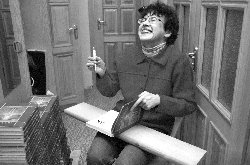Oksana Zabuzhko on male mental stereotypes and her new book

The Bukva [Letter] Bookstore hosted an event February 26 long awaited by the Kyiv public; Oksana Zabuzhko presented her new book titled Sister, Sister
The new collection of prose by the noted author is made up of sev en texts, heretofore not known to the Ukrainian reader. Of these texts the stories Sister, Sister, The Girls , and The Tale of the Guelder Rose Fife are likely to be especially popular with the reader. They constitute a trilogy of sorts. However, the other stories —
Milena, The Tennis Coach , and The Alien Woman — will find read ing audiences of their own. After Zabuzhko’s best-selling Field Studies of Ukrainian Sex the number of her adherents has been steadily increasing.
Prior to the event, our corre spondent met with Ms. Zabuzhko and posed several questions to her.
Ms. Oksana, your Sister, Sister appears to be a hundred percent original. Is it?
It is true that these texts have never before appeared in Ukraine in any book format. However, what makes the situation dramatic is that some of these texts appeared in print, at different times and in other lan guages. For example, my Girls was first published in Russia, in Russian. The
Field Studies and Milena were commissioned for a North American anthology; they were published in English. In a word, these are aspects little if at all known to the Ukrainian reader. This collection represents all of my favorite small prose from the 1990s.
What is this book about? Does it have any noncritical motives?
Skurativsky wrote the foreword. He found the leitmotif embracing the whole Ukrainian identity... Yet we shouldn’t make any of this too com plex. The leitmotif is in the heading. Briefly, the book is about love and death, about things best understood by women. Of course, it’s prose meant for women. I don’t mean a ladies’ novel. I mean the plot, some thing I’m interested in; the woman as such, all those innermost recesses of the female subconscious still to be researched, subjects seldom broached by our literati. Things which I believe can be written only by a woman. Nabokov’s Lolita is one thing. He sees her outwardly, as an object of his carnal desire. What that girl might have in her head is something only another woman can perceive. The Girls deals with this subject, women’s relationships in general. Here this subject is vulgar ized as seen through man’s eye, whereby women either compete with each other, trying to win their men, or become lesbian — which is also sexually attractive to men.
And on the other hand?
Relationships among women, women’s friendship. These topics are far more sophisticated. Women’s associations, knowledge, experience form all those undercurrents in his tory. Outwardly, men fight and cre ate empires, but there is always that undercurrent made by women, by all those grannies telling stories to their granddaughters, making history.
This experience secures conti nuity. Empires emerge and fall, yet women’s experience is handed down, it’s a continuous process. This experience of female survival world wide would be impossible without all those women’s associations. It is also true, however, that the women’s world, ever so esoteric and closed, has always inspired fear in the stronger sex. Myths were created. I was interested in precisely that kind of reality that no male authors would ever undertake, because it’s an entirely different kind of experience. It’s not a feminist approach. I always say that I don’t write on behalf of the women, but on behalf of fellow human beings called women. Men have had ample time to write world history starring men.
True, they tried to write about women, but even the most talented failed to produce an adequate por trayal. Here is a text-book example. Anna Akhmatova analyzed Tol stoy’s Anna Karenina at all possible length and depth, and proved that the heroine’s mentality was falsified. In other words, Count Leo Tolstoy had adjusted the plot to his ideological pattern. Meaning that in this case the portrayal lacked feminine authentic ity. Getting back to your question, I would like to emphasize that the heading of my book sets the tone. The first three stories form an anthol ogy of sisterhood, feminine affinity that can be conflicting or dramatic, yet remaining truthful to the por trayal of women. I also think that men will find these stories interest ing to read.
Talking of sisterhood, the notion is actively employed by radical feminists. Could the con






